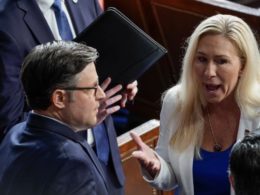US House Speaker Mike Johnson plans to move foreign aid through the House by proposing four separate bills for Ukraine, Israel, Taiwan, and other national security priorities, aiming to pass these bills separately this week, responding to far-right demands to avoid combining them into a Senate-passed bill, according to reports from The Hill and CNN
citing their sources.
However, Republican leaders may take procedural steps to consolidate these bills into one package for the Senate, potentially angering the right wing of the House GOP conference. as per CNN.
For more than six months, US Congressional Republicans have been blocking the US foreign aid package, which includes military assistance to Ukraine, Israel, and Taiwan. The Senate approved a $95 billion bill in February, including over $60 billion for Ukraine and $14.1 billion for Israel, but House Speaker Mike Johnson has delayed bringing it to a vote, citing the need not to rush. There is no set date for a House vote yet. Moreover, passing new bills instead of the Senate-approved legislation would require Senate re-approval following the House vote, which means further delay of the Ukraine aid.
Speaker Johnson unveiled his proposal after months of delays during a closed-door House GOP conference meeting on 15 April. According to two GOP lawmakers present, the plan involves moving the four bills under a single procedural rule that would permit an amendment process, The Hill says.
According to one GOP lawmaker, the fourth national security-related bill will include a TikTok ban, provisions to use seized Russian assets to aid Ukraine, a lend-lease act for military aid, and convertible loans for humanitarian relief.
Whatever the House passes will be combined into a single package and sent to the Senate, where its prospects for becoming law remain uncertain.
Trump wants Ukraine aid to be a loan
CNN says former US President Donald Trump, who recently met with House Speaker Mike Johnson at Mar-a-Lago, has indicated his openness to structuring Ukraine aid as a loan. GOP Rep. Kevin Hern told CNN that House Speaker Mike Johnson is accommodating demands from far-right Republicans by allowing relevant amendment votes on these bills.
Earlier, Ukraine's President Zelenskyy stated that Ukraine is open to receiving US aid in the form of loans if it is provided promptly, emphasizing the urgency of support over its form to ensure the country's survival and victory.
Rep. Hern confirmed that the current plan does not include border provisions, potentially inciting opposition from hard-line conservatives who insist that any aid for Ukraine be coupled with measures to address the southern border situation, The Hill reported.
White House opposes separate bills
Earlier on 15 April, the White House firmly opposed any standalone Israel aid bill, urging the inclusion of aid for Ukraine and Taiwan in a comprehensive $95 billion package, citing potential delays in needed aid if passed separately.
In February, when the House was considering a separate Israel aid bill, US President Biden threatened to veto it and rallied Democrats to defeat the proposal successfully.
"Churchill or Chamberlain moment"
On 15 April, House Minority Leader Hakeem Jeffries criticized Speaker Johnson for not bringing a $95 billion aid package, approved by the Senate in February, to a House vote, where it has since stalled due to Republican divisions over Ukraine aid, CBS News reported.
In a letter to colleagues, Jeffries emphasized the urgency for Congress to address recent serious events in the Middle East and Eastern Europe by promptly adopting the bipartisan national security bill passed by the Senate.
Jeffries described the situation as a "Churchill or Chamberlain moment," referencing the contrasting approaches of the British prime ministers during World War II, where Chamberlain's appeasement policy famously failed to prevent Hitler from initiating the war.
Read also:
- White House rejects possible standalone House Israel aid bill, insists on including Ukraine
- ISW says Ukrainian air defense depleted due to delayed US military aid
- US House Speaker Mike Johnson pushes for Israeli aid this week, leaves Ukraine support uncertain
- US House Speaker in talks with White House over stalled Ukraine aid
- Top US general warns Russia to gain 10:1 artillery advantage in Ukraine “within weeks”
- WP: Russia’s strategist and troll army wages info war against US support for Ukraine, leaked documents show
- Trump’s advisor slams news about a plan to force Ukraine to surrender territories as “fake”
- Zelenskyy says Ukraine is open for loans as a form of US aid if it is provided timely





